
Canadian Journal for Traditional Music (1997)
"She's Gone Boys":
Vernacular Song Responses to the Atlantic Fisheries Crisis
Abstract
Abstract: In July 1992 a moratorium on the commercial fishing of cod, the staple of the North Atlantic fisheries, was enacted by the Government of Canada. Because of the continued decline in fish stocks, the moratorium has been maintained, and fishing for domestic personal consumption has also been prohibited. Various compensation programs have not atoned for the demise of what is regarded as a "way of life." Responding to the crisis, vernacular verse, mostly in song foriii from Newfoundland, reflects the inadequacies of such programs. In addition, these creations assign causes and solutions while revealing a common usage of musical style, language and signifiers which combine to affirm an allegiance to traditional collective values of family, community and province through nostalgic experience. Some of the versifiers have turned to the craft for the first time during this disaster because they view songs and recitations as appropriate vehicles for social commentary.
* Versions of this paper were presented at the 1994 Annual Meeting of the American Folklore Society, October 12-15, Lafayette, Louisiana; the 1995 General Meeting of the Canadian Society for Traditional Music, November 10-12, Toronto, Ontario; and the 1996 Crossroads in Cultural Studies Conference, July 1-4, Tampere, Finland.
Traditions of songmaking and versifying responsive to local events (Mercer 1979 O'Donnell 1992: 132-47; Overton 1993; Sullivan 1994) continue to thrive in Atlantic Canada, especially in Newfoundland. As with the sealing protests and counter-protests of the 1970s (Lamson 1979), area residents view as a tragedy the latest event to prompt vernacular poetics and music (i.e., elements of expressive culture the people of a particular region identify as their own: cf. Narváez 1995).
Unlike the demise of th.e limited seal fishery, the moratorium. on fishing northern cod, first announced July 2, 1992, has directly undercut the basis of the North Atlantic fisheries. Described by Canadian historian Jack Granatstein as the "biggest layoff in Canadian history" (Evening Telegram, July 3, 1992), this fishing ban is an economic tragedy of unprecedented proportions. Originally imposed for two years, it has been extended by the Canadian government, and moratoria on the fishing of other species (capelin, salmon, turbot) have followed. These actions have put approximately 50,000 fishers and fish-plant workers out of work in the region, 30,000 of these in Newfoundland.
Although the Federal government has instituted two major compensation and retraining programs (NCARP, The Northern Cod Adjustment and Recovery Program, August 1, 1992 to May 15, 1994, and TAGS, The Atlantic Groundfish Strategy, May 16, 1994 to May 15, 1999), these have not offset what is widely perceived as the loss of a traditional "way of life." This study examines expressive responses to the fisheries crisis, largely in Newfoundland, by analysing the lyrics of, at this point, 43 songs and 6 "recitations" (i.e., monologues: Wareham 1984) as performed by 43 solo artists and groups. 1.
Moratorium Songs
My compilation of songs owes much to the cooperation and generosity of journalists in electronic and print media. I have occasionally discussed my interest in such songs on CBC Radio and in the St. John's Evening Telegram, and subsequently learned of items I had been unaware of. At some point, what I had termed "songs responding to the fisheries crisis" came to be called "Moratorium songs," a descriptive phrase I use in this report.
Provenance and Background of the Songs
The songs considered here originated between 1992 and Spring 1996. Individuals or groups Newfoundland perform 37, Newfoundlanders the "Mainland" of Canada sing three, and one is from Prince Edward Island. I do not know the provenance of the remaining two songs, although one of the singers resides in Ontario. Nine lead singers are women, of whom seven wrote their own songs. To my knowledge, only six performers are full-time entertainers. For most, entertaining publicly in their localities is an enjoyable avocation whereas a few perform only in their own homes.
1. Since this article was written, about 20 more items have been compiled, but the rate of new songs seems to have slowed somewhat.
Most of the songs have been commercially available on audiocassette or CD. Usually pro-duced privately in small home recording studios, they have had very limited distribution (see "Audiography"). Because the largest sales have been in singers' home communities, I liken the songs to broadsides of yesteryear, especially as they consist of formulaic commercial verse on topics of local interest. Other pieces have not been for sale but have been transcribed to paper and or prerecorded and sent to radio programmes or have been directly recorded on answering machines for radio shows, especially the "Fisheries Broadcast" (formerly "Fishermen's Broadcast": see Narváez 1991), one of the CBC's oldest continuous programmes. Several have been performed at special public entertainments and then aired on radio and television.
Musical Styles
The songs are in many musical styles. Two humourous performances satirize several of these idioms. Ten songs feature popular folk-revival and singer-songwriter styles, frequently characterized by heavily accented chordal accompaniments and. minor melodies, whereas two items combine tragic-ballad and rousing male-chorus conventions of the Irish folk-revival. But almost half (20 of the 43) are performed in country music styles and the related New-foundland style, a musical syncretism in which traditional melodies, rhythms, an.d button accordion are joined with musical content and traditional forms from Britain and Ireland, and country music of the United States, the Maritirnes and mainland Canada (Narváez 1978).
Composed by Wayne Bartlett of Quirpon, "She's Gone, Boys, She's Gone" (Ex. 1) illustrates this New-foundland style. Bartlett saw (1996):
... what was happening to a way of life that 1 loved when I was a boy, lose its interest in the lives of my son and his friends.... The fishery and the whole system failed my son in that his last chance at a decent job was taken away from him by the closure, the Moratorium. One time, if a young man could not find a job, he could always depend on the fishery to earn a living for himself and his family. In the song, "She's Gone Boys, She's Gone," there's an old man and a young boy. The old man tells of what he saw when he was younger, tells the young boy that none of the younger generations will ever see those things because now she's gone.
Since outport Newfoundland has borne the brunt of the Moratorium — 400 communities thrown onto the brink of dissolution — the choice of a syncretistic musical style as a mode of communication by outport performers is hardly surprising. Although my calculations are incomplete, the vast majority of songs performed in Newfoundland style and country styles have been composed, played and sung by outport residents, virtually all having a stake in the fishery.
Lyrics
The lyrics of Moratorium songs respond explicitly to the fisheries crisis. Not included in this survey are older songs which have been used as vehicles of social protest in performance contexts within the crisis. However, this is not to deny their importance. The most significant and popular of these in New-foundland is undoubtedly Otto Kelland's "Let Me Fish Off Cape St. Mary's" (Smith 1996). When sung by the huge fisher chorus, "Folk of the Sea," in synch with their commercial recording, and 6,000 emotional demonstrators, the obvious lyrical sentiment of the song provided a poignant greeting for the arrested Spanish trawler Estai, as it was escorted by two Canadian patrol ships into St. John's harbour on March 12, 1995.
Deemed traditional fishery songs by the public, such songs as "Let Me Fish Off Cape St. Mary's," "Hard., Hard Times" (Joyce 1991 ) and others from the "canon" of Newfoundland folksong (cf. Rosenberg 1991a, 1991.b), have sometimes been used as vehicles of protest. Not nearly as well known and very limited in their distribution, songs dealing explicitly with the Moratorium are topical and express specific opinions on occupation and employment. Though not insider occupational songs in Gerald Porter's sense of focusing on "the work process in terms of its tools and routines" (1992: 24), they are insider occupational songs in a broader sense of depicting the milieu of a trade and expressing concerns about it, and because in most performance contexts "singer and audience are part of that same milieu." (Porter 1992: 14).

The old man looked. down in his dory As he stood on the wharf one more time.
With the wind in his hair, he stood there and stared "Look at her now, what a crime!"
Said, "I can recall when I. built her, When I lived in the place It called home.
'Twas a good life back then, but never again., 'Cause now, SHE'S GONE, BOYS, SHE'S GONE.
He said, "My father once told me
That surely there would come a day
When the fish that you'd get would be too sm ... all to split
And too big to just throw away."
I never thought that I'd ever live to see such going on.
To think that the end could ever have been,
But now, SHE'S GONE, BOYS, SHE'S GONE.
Refrain
She's gone, boys, she's gone, she's gone,
She's gone boys, she's gone.
What we didn't destroy, we allowed to die.
And now, she's gone, boys, she's gone,
SHE'S GONE, BOYS, SHE'S GONE, BOYS, SHE'S GONE.
He stopped for a moment, just stood there
With a handkerchief, he wiped his eyes.
He looked out to sea, then he looked at me
He said, "i pities you, boy.
You'll never see the great big old codfish
Float up in the trap and go on
Out over the heads like one time
Cause now, SHE'S GONE, BOYS,
He said, "You see that old dory;
One day I thought she'd be yours:
She's still just as good, you know, as she was,
Except for the gunwhaies and oars.
She might need. a new plank there somewhere.
And the bottom might be a bit drawn."
Then a lump in his throat as the old man spoke:
"SHE'S GONE, BOYS, SHE'S GONE, BOYS, SHE'S GONE."
Responding to a complex, critical issue, Moratorium poetics are poetics of persuasion affecting listeners in various ways through narrative, lyric, rhetorical, and polemical techniques—stressing, respectively, story, emotional state, logical argument, and confrontation. Although ballad styles previously have played a major role in Atlantic versifying, the fisheries crisis, like the sealing controversy that preceded it, has more often produced rhetorical and polemical songs.
By "rhetorical" 1 refer to lyrics that are forums of opinion: they pose social questions and provide some answers, but usually do not offer solutions that require organizational affiliation or joining a social movement (cf. Denisoff 1972: 61). By contrast, polemical songs are deliberately provocative, sometimes stridently engaging in oppositional argument and controversy. Like the songs Serge Denisoff has termed "magnetic" (1972: 5-6), polemical. songs attempt to prod and rally listeners, not only to agree on the nature of a given social problem but also to follow a specific path of social action to remedy it. The appeals to solidarity of organized labour songs are polemical, as are other forms of social protest that express victimization and accuse.
Composed by out-of-work fisher Ed McCann, the lyrics of Great Big Sea's "The Fisherman's Lament" (1993) vehemently condemn government authorities:
I stand in my doorway as the Moon rises high,
Over glorious ocean reflects the broad sky.
My heart it is aching so much I could die.
I've known only the ocean since I was a boy.
Refrain
And I spent my whole life out there on the sea
Some government bastard now takes it from me
It's not just the fish, they've taken my pride.
I feel so ashamed, I just want to die.
I fished with my father so long, long ago.
We were proud of our trade and in us it did show.
We held our heads high, there was lots of fish then.
That was the time when we were proud men.
We challenged great storms and sometimes we won.
Faced death and disaster, we rose with the sun.
We worked and toiled, we strained arm and brain.
We were a proud people, will we e'er be again?
My father, he is gone now and the fish are gone too.
Abused and mismanaged: oh, what can we do?
I'm too old to change, but what of my sons?
How will they know that we weren't the ones?
DFO* regulations admitted the rape
of our beautiful ocean from headland to cape.
They brought in big trawlers, they tore up our twine.
Politicians don't care for what's yours and what's mine.
You brave newfoundlanders, now listen to me
Shove the Package** to Hell, go back to the Sea.
If we don't stand our ground, we will fade away
And the bones of our fathers will turn into clay.
© Ed McCann, 1993
* federal Department of Fisheries and Oceans
** NCARP
As McCann, explained to me (1996), ecological concern and anger toward authorities prompted "The Fisherman's Lament":
I come from a fishing family. My father, grandfather, etc. fished and farmed for a living at Gull Island, Conception Bay. I began fishing with my father at about age twelve. A tragedy in my family (-two older brothers were drowned at age fifteen and seventeen) forced father to take me in the boat with him. I fished with him for five summers. The depletion of our vast cod stocks due to mismanagement in one form or another touched a nerve within me and my anger is expressed in the words o the "Lament."
Whether one persuades through narration, lyricism, rhetoric, or polemic, three factors play a decisive role in convincing listeners: the identity of the performer; the 'performer's role as singer-narrator; and the identity of the lyrics' protagonist. Generally, Moratorium songs not only exhibit a unified first-person subject "I," comprising both the performer and the singer-narrator, but also in most of these songs the first person is the protagonist as well. The homogeneity. of communication in this unity of énonciation (act of uttering) and énoncé (utterance) strongly urges the listener to claim a space within the performance.
As discursive formations, Moratorium songs may be viewed as devices by which problems are articulated and potential solutions or analyses proposed. The Appendix summarizes these, identifying relevant songs itemized in the audiography.
Loss of Traditional Culture: Foodways and Songs
While the often used image of an old fisherman may index the passing of an entire way of life, many problems of lack cited in. the songs are quite precise: from the loss of a favourite Newfoundland dish, "fish and brewis,"
Last year we were out fishing; this year we're on the land:
Me and brother George, me son, we started up a band.
There's no use to ignore it, there's nothing else to do:
Tonight we're cooking up some beans instead of fish'n' brewis.
("The Moratorium," Jim and Chris Buffett, 1993)
Since government brought in the Moratorium,
We haven't tasted fish n' brewis.
Our boats will soon be old and rotten,
Without their skippers and their crew. ("Searching for a Rainbow," Harris Porter, 1994)
to the loss of song tradition itself (e.g., "I'se the B'y," "Lukey's Boat," "The Tiny Red Light," "Little Boats of Newfoundland.," "Hard, Hard Times"):
I wonder what folklore changes will come,
Now that the word is Moratorium?
Refrain
You see, I'se the b'y can't sell his boat;
Lukey's crew won't need the grub;
No need to place the tiny red light.
The little boats don't go to sea;
There's no fish off Cape St. Mary's:
Those are hard, hard times.
("I'se the By and Other Stuff," George Hewison and the Rank' n File Band; Owen Marsden, songwriter, 1993)
Diachronic Changes in the Responses: From Humour to Frustration
Diachronically, Moratorium song texts have changed: from positive and sometimes humourous responses to the initial Federal financial "Package," thought by some to be a "windfall,"
Refrain
Oh the Moratorium, the Moratorium,
We'll buy ourselves a brand new car
On THE MORATORIUM.
I got myself a Big Bear, and George, he got a Skidoo,
We're running round the rabbit roads, so you can join us too.
With the money that we're making pretty good, my son,
I'll buy myself a brand new car on THE MORATORIUM
("The Moratorium," Jim and Chris Buffett, 1993)
to later expressions of frustration and anxiety, as the Moratorium has continued and the extent of the ecological disaster has become apparent, as in. The Irish Descendants recording of John Phippard's 1994 son.g "Will They Lie There Evermore?":
I was born under the star, never meant to journey far,
From all the faces and the places that I called home.
And my father lived the same, and his father before him,
But now i see in my son's eyes, something has changed.
And the smoke it has stopped rising from the chimney up the road,
And the light no longer shines over the door.
Last year I leant a hand to haul the boats onto the land:
They're been lying there for nineteen months or more,
And I wonder, WILL THEY LIE THERE EVERMORE?
Wasn't many years ago that the men 'round here would go
Out in their skills and ahul their traps out on the Bay.
And then shortly they'd return, loaded down from stern to stern
And weight off the fish, then store the gear away.
Now the waters are as barren as the cliffs that guard the cove
And catch the north wind blowing off the shore.
And i wonder how an ocean turns as lifeless as a stone,
and I wonder, can the sea revive once more?
And i wonder, WILL THEY LIE THERE EVERMORE?
Well, I hear some people say we'd be better off to say
Ashore and train for jobs outside the fishery
Now woulvn't I look like the fool, traipsing off to school
After forty years of living off the sea.
Npw my son, he's barely twenty-one, and handy at the trawl
For years he helped me fish the Labrador
Now he's moving to Ontario before the first snowfall:
"Dad, there's nothing left for me 'round here no more."
And I wonder, will i see his children born?
And I wonder, WILL THEY LIE THERE EVERMORE?
© John Phippard, 1994
Originally from Placentia, Phippard was inspired to compose "Will They Lie There Evermore?" by both the fisheries crisis and the retraining programs. As he wrote me in 1996:
At the time, there was a lot of news about the crisis in the fishery, the Moratorium, and so on. One of the things being discussed was the idea of retraining fishers for jobs in other industries. I had worked in the field of adult literacy training and was aware of some of the problems inherent in retraining, especially as it concerns older workers. I believe that was how the idea for the song came about. I know that among the lyric notes, one of the first drafts contains the line, "They must think that I'm some fool to go try my hand at school after 40 years of livin' off the sea."
Restrictions on the jigging of cod, widely viewed as a natural Newfoundland right, prompted Bobby Evans of Glovertown to propose a solution that recalled the traditional sense of "scoff" as a stolen feast (Taft 1986). As Evans wrote me (1996), "When the government came out with the fish Moratorium for the food fishery, landi I noticed that. a number of people were jigging fish for the table late at night (for obvious reasons) the name, 'Jig One on the Sly' came to mind":
Refrain
Now the hardbread's getting lonely, soaking there all by itself.
Says *Brian, "Weigh the jiggers and goodbye!"
Now the only way to get one for the pot on Sunday morn
Is to go out there and JIG ONE ON THE SLY.
'Twas a time when we could boast about our favourite good old stuff;
Fish'n' brewis was known to people far and near.
And I'm sure that when they said we weren't allowed to fish no more,
Every dry eye in the country shed a tear.
How good it was to come home to a feed of fish'n' brewis.
With **scrunchions fat and onions boiling hot: Mmm mmm.
But the ocean is like a desert: it's been scraped so many times
That there's hardly a single codfish to be got.
© Bobby Evans, 1994
*Brian Tobin, federal Fisheries Minister
**cnsp pieces of pork fat
The Arrest of the Spanish Trawler Estai and the "Turbot War"
As emphasized above, the most dramatic episode of the fisheries crisis was the Canadian Government's arrest of the Spanish trawler Estai on the Grand Banks in January 1995 and the subsequent "turbot war" with the European Union. These events inspired expressions that vented pent-up anger at the Moratorium by providing an unambiguous culprit: Spain. Significantly, these positive expressions voiced support for the Government of Canada: specifically, praise of Newfoundlander, Brian Tobin -at the time federal Fisheries Minister, now Premier of Newfoundland and Labrador.
Regional esteem of Tobin was well expressed in an untitled recitation by fisher Gideon Sheppard:
I am an inshore fisherman from Lark Harbour, Newfoundland,
Who due to the Moratorium is now upon the land.
There has been much overfishing by the foreign fleet;
It's been talked about by everyone who I've chanced to meet.
It's been told at meetings and at forums too,
We all knew what was happening, but what could we do?
The government set the quotas, but it didn't mean a thing:
They were comin', factory boats—at home our fish would bum.
Well, the cod fishing is over now that's within two hundred miles,
And the way they are talking, it sure will take a while
Before we can get out there and catch the fish again.
It's caused many arguments and also pain.
Our politicians stood by and didn't do a thing,
But it was very easy to see what was happening.
With forty thousand people laid off in Newfoundland,
Our Minister of Fisheries did finally make a stand.
It all started when the quotas were finally cut:
It wasn't about cod; it was the Greenland halibut.
Now he first set the quota at twenty-seven thousand tons,
But the European Union didn't agree with what was done.
We are not satisfied with the message they sent,
And instead of twelve-point-five, they wanted sixty-nine percent.
So they kept on fishing: they never had enough.
It was then that Mr. Tobin decided to get tough.
They were told to leave the turbot alone,
By orders on the radio and on the megaphone.
It was on the ninth of March that the showdown did come:
When they tried to board the Spanish ship, she began to run.
She didn't want to be taken, it was very clear:
She was in such a hurry, she cut her own fishing gear.
But the Coast Guard gave the orders: "Stop, and I mean now!"
And they had to convince her with four shots across her bow.
They put the tow-line on her and brought her into port:
That is when our people really showed their support.
They showed up in St. John's over six thousand strong
To show support for Tóbin that he had done no wrong.
When they checked the Estai, they found the fish were small:
With the crisis in the fishery, they shouldn't be taking at all.
They were driven out of Iceland a few years ago,
And they should have been drove from here before our stocks ran low.
Yes, the Newfoundlander showed them what he could do:
I hope they got the message—Spain, and other countries too.
•Mr. Tobin, of you, we are all very proud
So drive out the foreigners: they shouldn't be allowed.
From other countries around the world, you do have support,
And I was very happy when you towed the ship in port.
We all like the way that you took your stand.
This is just an opinion from and inshore fisherman.
© Gideon Sheppard, 1995
and in the song "Tribute to Brian Tobin" by Newfoundland entertainer Eddie Coffey and Marty Delaney:
Oh! my name is Brian Tohin and I'm here to work me plan,
And keep the fishing trawlers off the Banks of Newfoundland,
The Spanish fleet and all the foreign vessels will be banned,
From fishing in the waters on the Banks of Newfoundland.
Refrain
Oh! the Portuguese, the Japanese, the Norwegians, and the French,
And all the Spanish trawlers fishing there upon the Banks,
You're breaking all our fishing laws, I hope you understand,
And the ocean's done away with on the Banks of Newfoundland.
Oh! the horns they sound on the fishing ground and they tried to reach its side;
the baby turbot swims away, but they got no place to hide;
And the old wharf-cutter goes to work, and just the way we planned:
No ifs and buts, their trawls are cut on the Banks of Newfoundland.
Oh! we don't need tanks out on the Banks, 'cause there won't be a fight,
So start to haul your fishing trawls, 'cause what you're doing ain't right.
For years and years, the baby fish were caught and boxed and canned:
I should have done this years ago on the Banks of Newfoundland.
Oh! ten years from now you'll wonder how we made it all work out, And the younger ones would wonder what this song was all about: Well, it's just their obligation to remember my command,
And keep the Spanish trawlers off the Banks of Newfoundland.
© Eddie Coffey, 1996
Tobin's elevation to the status of a national hero was lampooned on CBC Radio by Ontario resident Kirk Elliot, in his song "The Ballad of Brian Tobin or 'Let My Turbot Go," sung triumphantly to the melody of the country music classic "Ghost Riders in the Sky":
Once there was a turbot way down in the sea,
Swimming by his lonesome, saying," What will become of me?
The Spanish fleet's a-coming, and can you tell me why
They're fishing off the nose and tail 'til the Grand Banks run dry?"
He'd seen the Spanish fishing nets, his mortal enemy;
He'd seen them sweep the cod that once swam proud and free.
So he stuck his little head above the waves that were so high
And he called for Brian Tobin to hear his mortal cry.
Refrain
Yippee aye a
Yippee aye o
Let my turbot go.
Tobin set patrol boats upon the Spanish ships.
They tried to rally 'round and tried to give us the slip.
The Estai cut its nets and turned to run away,
But soon it was surrounded and brought to St. John's Bay [sic].
It's captain was arrested and Canadians were told
That tons of baby turbot was hidden in that hold.
The fisherfolk from Newfoundland let out a mighty cheer.
They took the Spanish sailors and they bought them all a beer.
The European Union was said to pop its cork:
They called Tobin a pirate when they met him in New York;
They said no one in Europe will believe a word of this.
Tobin hung the Estai's nets up, said," come on, have a whiff!"
Now, come on, you Spanish captains, who look at us and scoff,
Don't mess with Brian Tobin or he'll cut your nets tight off.
And all you folks in Canada, I hope you like the tale
Of the little baby turbot with the courage of a whale.
Conclusion
In explaining to me why he penned his poem in praise of Brian Tobin, Sheppard articulated how creating verse centring on events provides an important traditional outlet for expressively communicating concerns about critical social issues (1996):
I was a fisherman who had noticed the decline in fish stocks in the last few years. It had been very hard to make a living at the inshore fishery. I realized that there was a lot of overfishing, not only by the foreign fleet, but by our own as well. Our other ministers of Fisheries and our scientists failed to do anything about it. When Mr. Brian Tobin decided to do something about it, I was thrilled and decided to write about it. I only started to write poems in 1992. 1 find that it is the best way I can express myself.
In Atlantic Canada Sheppard is hardly alone in judging rhyme to be the most appropriate vehicle for social expression. Traditional songmaking and versifying continue to be alive and well.
References Cited
Bartlett, Wayne. (1996). Personal correspondence with author, Sept. 5.
Denisoff, R. Serge. (1972). Sing a Song of Social Significance. Bowling Green: Bowling Green University Popular Press.
Evans, Bobby. (1996). Personal correspondence with author, July 12.
Evening Telegram. (1992). "Northern Cod Shutdown 'Biggest Layoff' in Canada." (St. John's, July 3): 2.
Great Big Sea. (1993). "Fisherman's Lament" on Great Big Sea. NRA Productions Ltd., CD, NRA3-1002.
Joyce, Jim. (1991). "Hard, Hard Times" on Kelly
Russell and Don Walsh, prods. Another Time: The Songs of Newfoundland. Pigeon Inlet Production, CD, PIPCD 7326.
Lamson, Cynthia. (1979). Bloody Decks and a Bumper Crop: The Rhetoric of Sealing Counter-Protest. (Social and Economic Studies 24). St. John's: Institute for Social and Economic Research.
McCann, Ed. (1996). Personal correspondence with author, June 12.
Mercer, Paul. (1979). Newfoundland Songs and Ballads in Print, 1842- 1974: A Title and First-Line index. St. John's: Memorial University of Newfoundland.
Narváez, Peter. (1978). "Country Music in Diffusion: Juxtaposition and Syncretism in the Popular Music of Newfoundland." Journal ofCountry Music 7/2: 93-101.
_____. (1991). "Folk Talk and Hard Facts: The Role of Ted Russell's 'Uncle Mose' on CBC's 'Fishermen's Broadcast" in Gerald Thomas and J.D.A. Wid— dowson, eds. Studies in Newfoundland Folklore: Community and Process. St. John's: Breakwater, 191-212.
_____. (1995). "Newfoundland Vernacular Song." in Will Straw et al., eds. Popular Music: Style and Identity. Montréal: Centre for Research on Canadian Cultural Industries and Institutions, 215-19.
O'Donnell, John C. (1992). "And Now the Fields Are Green ": . Collection of Coal A4iiiing Songs in Canada. Sydney, NS: U College of Cape Breton Press.
Overton, Jim. (1993). "Newfoundland in the 1930s: Voices of the Unemployed." Socialist Studies Bulletin 33 (July-Sept.): 8-19; 34 (Oct.-Dec.): 3-29.
Phippard, John. (1996). Personal correspondence with author, Oct. 6.
Porter, Gerald. (1992). The English Occupational Song. Umea, Sweden: U of Umeà.
Rosenberg, Neil V. (1991a). 'The Gerald S. Doyle Songsters and the Politics of Newfoundland Folk-song." Canadian Folklore canadien 13/1: 45-57.
_______. (1991b). "Om.ar Blondahi's Contribution to the Newfoundland Foiksong Canon." Canadian Folk Music Journal 19: 20-7.
Sheppard, Gideon. (1996). Personal correspondence with author, Oct. 25.
Smith, Jennifer. (1996). "Songs of the Dory Man." Th e Evening Telegram (Sept. 7): 17.
Sullivan, Lisa. (1994). "No Part of Our Life: Local and Official Constructions of Meaningful Work in Contemporary Newfoundland." Labour! Le Travail 34: 189-209.
Taft, Michael. (1986). "Of Scoffs, Mounties and Mainianders: The Popularity of a Sheep-Stealing Ballad in Newfoundland." in Peter Narváez and
Martin Laba, eds. Media Sense: The Folklore-Popular Culture Continuum. Bowling Green, Ohio: Bowling Green State University Popular Press, 77-98.
Wareham, Wilfred. (1984). "The Monologue in Newfoundland Folk Culture" in j. R. Smaliwood et.
al, eds. Encyclopedia of Newfoundland. St. John's: Newfoundland Book Publishers, 2: 252-62.
Audiography
Anon. (1995). Untitled recitation. Unidentified radio performance on tape from Elizabeth Cull.
Baker, Kristin and Leo Baker. (1994). "Moratorium." SWC Productions, cassette, nn.
Bartlett, Wayne. (1992), "She's Gone Boys, She's Gone." SWC Productions, cassette, nn.
Best, Anita. (1995). "Which Side Are You On?" CBC Radio, Morningside, March 2.
Buffett, Jim and. Chris Buffett. (1993). "The Moratorium Song." ni, cassette, nn.
Butler, Hedley. (1994). "We Took Enough." CBC Radio, St. John's, Fisheries Broadcast.
Cat Fud. (1995). "The Boys From Spain." CBC Radio, St. John's, The Morning Show.
Coffey, Eddie and Marty Delaney. (1996). "Tribute to Brian Tobin." RMS, cassette, 0196.
Elliot, Kirk. (1995). "Batiad of Brian Tobin or 'Let My Turbot Go'." CBC Radio, St. John's, The Morning Show.
Evans, Bobby. (1994.). "Jig One on the Sly." ni, cassette, nn.
Fitzgerald, Dennis. (1994). "The Patrick and Elizabeth." CBC-TV, St. John's, Land and Sea.
Fowlow, Susan. (1995). "Dad Was a Fisherman." Private recording from Francesa Swan.
Gallant, Lennie. (1994). "Peter's Dream." Columbia CD CK80196.
Great Big Sea. (1993). "Fisherman's Lament." NRA Productions Ltd., CD NRA3-1002, 1993.
Hewison, George and The Rank 'n' File Band.. (1993). "l'se the B'y & Other Stuff." ni, cassette, RFCD930I.
Hillier, Calvin (1993a). "I'm Going Back to SchooL" ni, cassette, nn.
_____. (1993b). "When the Last Ship Comes Sailing In." ni, cassette, nn.
Irish Descendants. (1994). "Will They Lie There Evermore?" Warner Music Canada Ltd., CD W88.
Lee, Fred. (1994a). "Back in School." ni, cassette, nn.
_____. (1994b). "We All Knew 'Twas Comin'." ni, cassette, nn.
Moonshiners, The. (1993). "The Good Days Are Gone." SWC Productions, cassette, 99321..
Norman, Wayne. (1992). "Way of Life." Private recording.
Payne, Jim. (1994). "Empty Nets." Mary Brown's cassette, TWP-093, (rec. 1992). cassette, TS-93.
Porter, Harris. (1994). "Searching for a Rainbow." SWC Productions, cassette, nn.
Power (O'Rourke), Ernestine. (1994). "Boy by My Stuffed Squid. CBC Radio, St. John's, Radio Noon. SWC Productions, cassette, nn.
Prince, John and A Piece of the Rock. (1994a). "Let's All Pull Together." Rattle Falls Publishing, CD IP 001.
. (1994b). "Where Do Old Boats Go?" Rattle Falls Publishing, CD TP-001.
Sheppard, Gideon. (1995). Untitled recitation. CBC Radio, St. John's, Fisheries Broadcast.
Simani. (1994). "It Could Be Worse." SWC Productions, casette, nn.
Soirees, The. (1993). "Crisis in the Fishery." nl, cassette, TS-93.
______. (1994b). "Package Song." SWC Productions, cassette, nn.
______.(1995) "The Last Water Haul." CBC-TV, Land and Sea.
Wallace, Len. (1994). "Leaving the Fishing Behind." CBC Radio, St. John's, Fisheries Broadcast.
Walsh, Junior. (1993). "I Used to Be a Fisherman.". nl, cassette, nn.
Whyatt, Sabrina. (1994). "What Has Gone Wrong?" Lloyd Bartlett Productions, cassette, LBP5 12301.
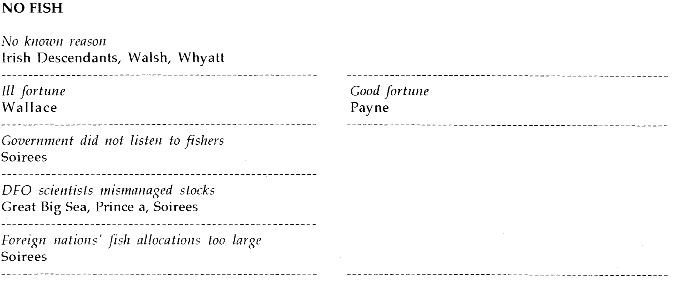


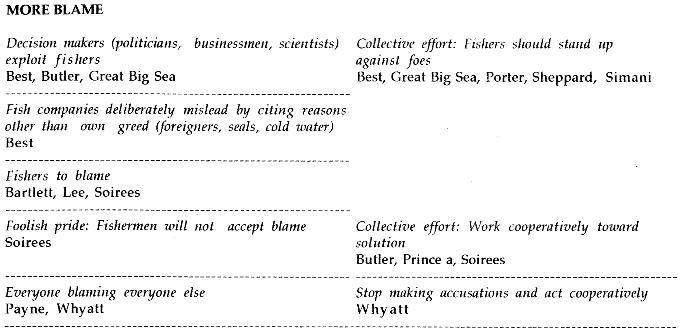
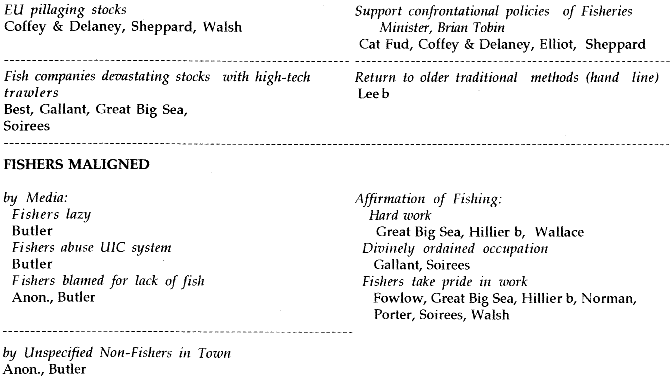

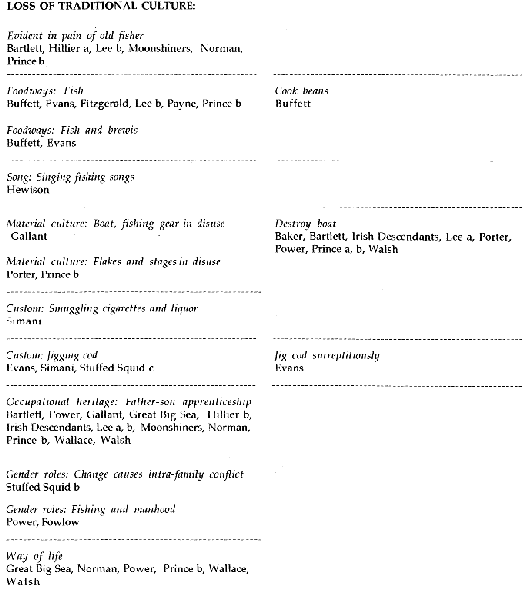

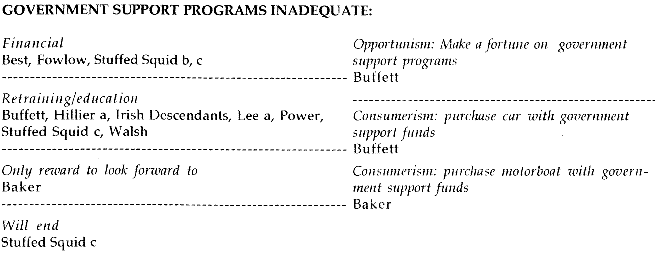
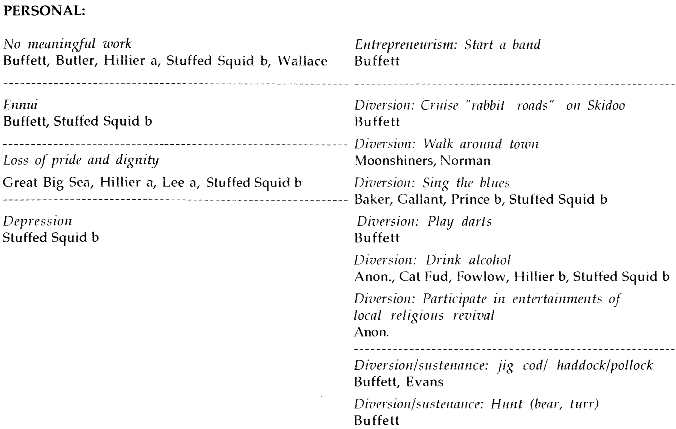
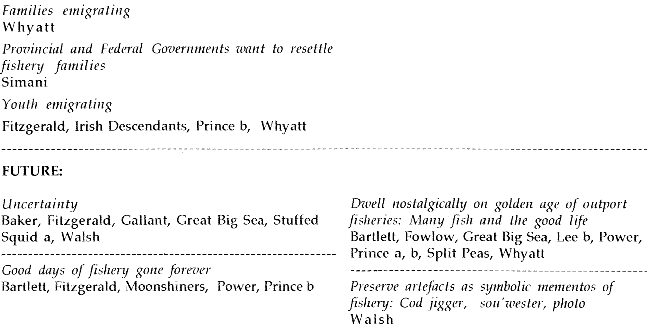
© Canadian Journal for Traditional Music